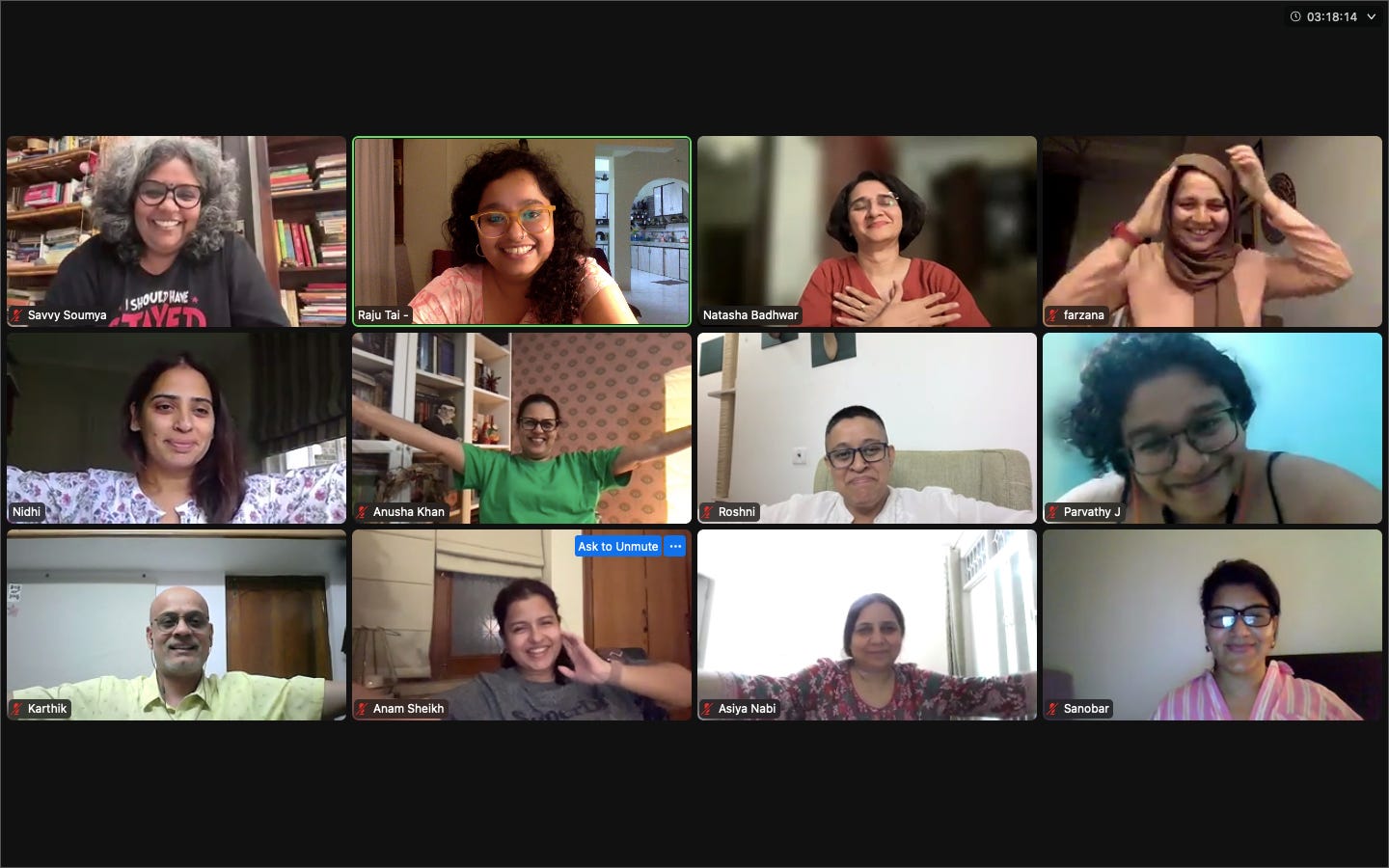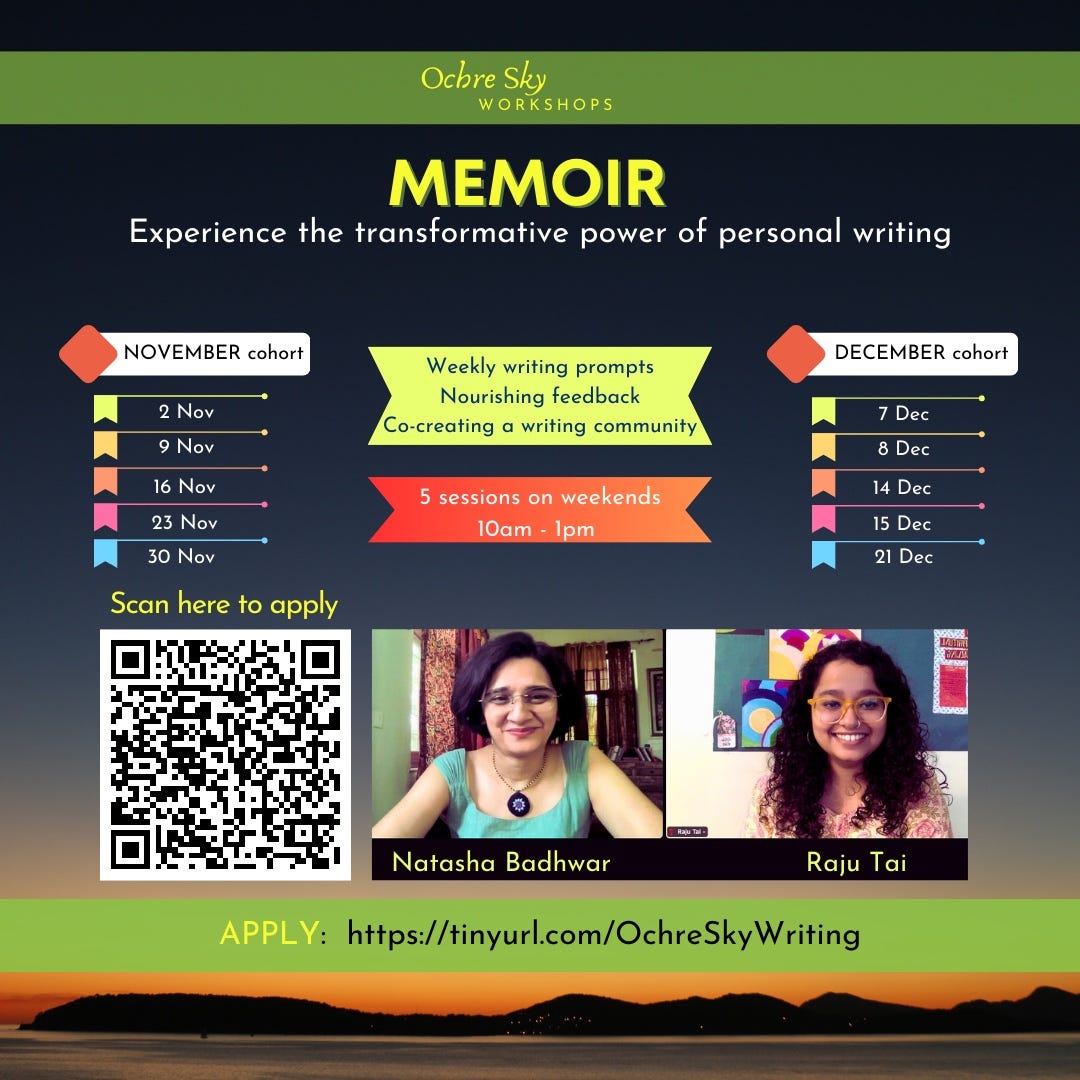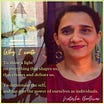Stories that demand to be told | #20
"If power corrupts, as we know it does, then the lack of power also offers us the gift of softness. And strength. We learn to compensate by tapping into our inner reserves."
This is the 20th edition of Stories that demand to be told, a curated spread of the most evocative, resonant, real stories. Welcome to Ochre Sky Stories, a home for writers from the Ochre Sky Workshops, facilitated by
and .1. Dastaan e -Murgh Musallam-a grief journey by
He cooked even after suffering from Dementia. He prepared it even when he coped with a nasty fall. He cooked on New Year's Evening. As he marinated the chicken in dahi & gently rubbed the garam masala on the chicken, we could feel his love for us. It was a celebration for his advanced year and his grandchildren. Ever in Covid year, he cooked it. We felt the pandemic recede as he tied the chicken stuffed with browned onion, kaju, and kishmish. That is one happy memory of the lockdown days when he delicately carved the chicken. I can still see the glow on my mother’s face, the anticipation in my son’s eyes, and how my daughter dug in the food.
2. A Close Shave by
When it is our turn to pass, Inspector Rawat looks into the car at the four of us, and squints. In the back, he sees two dark-skinned six-year-olds who look exactly like each other but nothing like the fair-skinned Nepali lady sitting between them. In the front, he sees an empty passenger seat, and the driver: a bald man with shades, who looks nothing like the three people at the back. He barely makes eye contact with me, his attention drifting to other parts of my face. I am made to park on the side.
“Who are the girls?”
“My daughters.”
“Your daughters?” I understand his question.
“Yes... We adopted them a few years ago.”
3. Trashy by
How do you get the government to care? I’m literally spiraling in frustration in the mangroves because I’ve forgotten the basic instructions on how to paddle yet again. I see my friends spin into action. Without words exchanged, we all begin to start pulling the trash into our kayaks. And soon we’ve cleared most of what is visible. It smells terrible and probably contains all kinds of spiders and crabs, but at this point, I am no longer squirming.
When we get to the shore, between the three of us we’ve collected two large cement bags worth of trash. Bereft of the trash; the mangroves are stunning. Tear inducing on a clear blue sky day.
4. the weight of an intention by
‘why is everything outside of the cupboards?’ - he asked while scratching his head, avoiding very direct eye contact with me.
‘my life. this is my life all around me’ - whispered this pretend ballerina.
‘um, okay. but i feel like we do this very often. can we maybe put it on the calendar for every four months?’ - says the confused partner surveying the landscape of ‘my life’ across the home we share.
i do the quick maths in my head, every four months sounds delicious and so i accept, ‘sure, and will you help me every four months?’
‘yes.’
and that’s all i needed to hear.
5. Childhood stories and blurry memories by
Tough times make the most dramatic stories. I grew up on a healthy dose of these stories. Not in the “When I was your age…” kind of way. I was never made to feel like I was ungrateful and privileged, which I probably was, within the bubble that was my childhood, but my parents were gracious enough not to point this out to me. The stories were told for the pristine reason that stories must be passed on from one generation to another – to keep alive that part of our history that would otherwise fade into oblivion. To show us who they were before life happened to them. To hope that those stories will serve as clues to figure out our own lives one day when we feel like we are failing at the game and ready to give up.
6. On the utility of disturbing dreams by
I now know that the mother-child relationship is one between two people, fused as they are in the early days. Like in any other intimate relationship, one is bound to feel unacceptable feelings. Unlike other relationships, the resolution of these feelings, at least for the mother, cannot come from communicating these feelings to the child. She is not an emotional equal..
..So where do these feelings go? It has been my experience that they find a way out in my dreams. As long as I pay attention to what my dreams are trying to tell me, I am able to function as a whole, acknowledging the complete spectrum of emotions that make me human. This acknowledgment allows me grace and kindness, feelings I rely heavily on in my motherhood journey.
7. Maybe this is why we tell stories by
Could telling stories count as living too? Is it a good life, sitting with our pen and paper, observing our world from the outside as it goes on turning? Why do we do this?
Perhaps because we remember stories we were told from those who went before us, stories that got us excited about the ride and now that we’re on it ourselves, we want to tell our versions hoping that someone might hear, someone who is contemplating getting off might be persuaded to stay on for a little bit longer, someone who is holding in a scream might hear ours and join in, someone who is about to miss that gorgeous sunset can be persuaded to look up from their phone and enjoy the moment, even if it means that we miss some of it, but that’s alright because we saw a glimpse and we might live to see it again.
8. One Bus Ride, Indira's Assassination and a Life That Changed Forever by
The year was 1984. On a whim that day, Radhe Shyam hopped onto the bus. Just a little over twenty, he found himself in the midst of a nation mourning the assassination of its prime minister—Indira Gandhi. The slain PM's son was about to take the oath, drawing people from all corners of the country to the capital, Delhi.
Some were moving towards Delhi to pay respect and show love; others were fascinated by the young and grieving Rajiv Gandhi with a charming personality. Radhe Shyam, belonging to a small village in Uttar Pradesh, meanwhile, just wanted a break from the daily rigmarole. Married too young, he wanted a break from his wife. He was flabbergasted by the sudden responsibilities of married life.
9. The names we carry by
As decision making goes when a baby arrives in your life, a name ranks high up on the list. Abbas and I had been talking about this one for years- even before a baby was on the cards.
I’ve always loved Urdu names. Their lilt, cadence and inherent khoobsurti. How the sound falls on the ear. Lightly, softly like leaves in the wind. Mahnoor. Jahan. Zulfiya. We had a list of options we’d keep adding to. So when the time came to choose one for our baby girl, the first name was a given. It was the second name where we found ourselves at odds. The it sounds confused argument just didn’t carry heft for me.
10. Of first jobs and waiting and life by
That interview was magical for how it kept me in the single minded focus, almost ‘flow’ state for well over an hour. Close to two. There was talk of estimating the cost and buying of buffaloes and some analogies for testing my math and finance skills and also concepts related to information gathering and market dynamics and economics and present value of money. And whether keeping the buffaloes or selling them or something else (trading?) might be a better option!
I enjoyed the mental tennis. And the rallies. And not losing points. And seeing my opponent’s cool moves. Storing them in my head for future practice and certain use. But importantly, finding a worthy sparring partner.
11. The superpower to acknowledge vulnerability by
Like most mothers, Sudha has spent her life being too busy to indulge in mellow moments with her husband or children. Too many people have depended on her. She has been relentlessly over-efficient. When you are uncomplaining and forever available to others, you never catch a break for yourself.
“I often feel that everything I write is just me trying to find my way back to Sudha, my mother,” I said to a friend once. The first time she responded to a text message, spoke up in a WhatsApp group, commented on something I wrote in the public domain – I remember the spark of joy I feel when I receive her words. She is speaking up. She is listening to my authentic voice.
If power corrupts, as we know it does, then the lack of power also offers us the gift of softness. And strength. We learn to compensate by tapping into our inner reserves.
12. Letting F.R.I.E.N.D.S go by
It is easier to watch F.R.I.E.N.D.S than living out actual messy friendships. Because it is a brilliant illusion. The basement feels so real. It is 10 seasons long. The camera quality is acceptable enough, even two decades later. When friends are roommates and neighbours, unmarried and childless, funny and fashionable, friendship seems like an endless dream.I wanted to wake up from this dream.
Since the pandemic, I’ve been in a transition. Letting F.R.I.E.N.D.S go so that true friendship can arrive. Learning the way friendship is fantasised about and the way friendship actually works. Instead of finding ‘cool’ people to befriend, seeking the wild essence of friendship - the sensation of being cared for, whether it is by the city, the writing community, the tree, the body.
Discover the transformative power of personal writing with Natasha Badhwar
and Raju Tai at Ochre Sky Stories Memoir Workshop.























Letting each stories ,settle in me,as I hit the pause button. From first job,to why we carry the names to why we tell stories etc from personal to the world view . Read people.